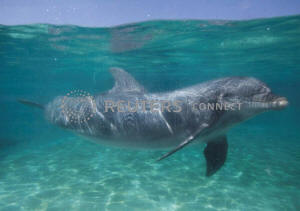|
Animal welfare activists urge end to
SeaWorld dolphin shows
 Send a link to a friend
Send a link to a friend
 [June 06, 2019]
By Alan Devall [June 06, 2019]
By Alan Devall
SAN DIEGO (Reuters) - Years after the
documentary film "Blackfish" galvanized a movement to end SeaWorld's
killer whale performances, animal rights activists on Wednesday called
for an end to "circus-style" dolphin shows at the theme parks.
At a hotel news conference near SeaWorld's San Diego park, the group
People for the Ethical Treatment of Animals (PETA) issued a report
documenting physical and behavioral harm it says dolphins suffer from
their use in live shows and confinement in captivity.
Of greatest concern was the practice of trainers riding dolphins through
the water while standing on their backs and beaks, said Dr. Heather
Rally, a PETA Foundation veterinarian.
Such stunts strain the marine mammals' sensitive lower jaws in a way
that can damage their hearing, injure joints and muscles and worsen
other injuries caused by confinement within holding tanks where the
dolphins are kept.

"We are asking SeaWorld to at least stop standing on dolphins' faces and
using them as surf-boards in these ridiculous circus-style shows," Rally
said. "We're asking them to retire these animals to seaside sanctuaries
where they can have the opportunity to thrive."
Subjecting dolphins "such unnatural behavior" may also provoke greater
aggression between the dolphins, she said.
As evidence of this, Rally said many of SeaWorld's dolphins were
observed with wounds or scars from "rake" marks sustained when one
animal is bitten by another while swimming.
'THEY'RE TREATED LIKE ROYALTY'
At a separate news conference, SeaWorld Entertainment Inc officials
defended their treatment of dolphins and denied the shows cause any
harm.
"They're treated like royalty," said Hendrik Nollens, SeaWorld's vice
president of animal health and welfare, insisting that if the behaviors
in question caused the animals any discomfort "they wouldn't come right
back and do it again."
"They are faster than us, they are stronger than us. They are in charge.
They choose. They decide whether to do the interaction or not," he told
reporters.
[to top of second column]
|

A bottle nose dolphin swims underwater in a pool at the animal theme
park SeaWorld in San Diego, California March 19, 2014. REUTERS/Mike
Blake/File Photo

The PETA report was co-authored by Rally and behavioral biologist
Toni Frohoff based on "in-depth observations" at all three SeaWorld
parks - San Diego; Orlando, Florida and San Antonio, Texas, they
said.
SeaWorld faced a public backlash and declining revenues following
release of the 2013 documentary "Blackfish," which depicted
captivity and public exhibition of killer whales as inherently
cruel.
The film, which SeaWorld criticized as inaccurate and misleading,
also explored the circumstances leading to the 2010 death of a top
SeaWorld trainer, who was pulled underwater and drowned by an orca
she had performed with in Florida.
SeaWorld trainers have not been allowed back in the water with
killer whales during performances since that incident. In March
2016, SeaWorld announced it would halt breeding of orcas in
captivity but that the existing whales would continue to perform as
they live out their remaining years.
"While there's no 'Blackfish' for the dolphins, it is essential that
this report ... have the same impact that 'Blackfish' had on orcas,"
the film's director, Gabriela Cowperthwaite, said at the PETA news
conference.
PETA said about 140 dolphins and some 20 orcas remain at SeaWorld
parks.
(Reporting by Alan Devall in San Diego; Writing and additional
reporting by Steve Gorman in Los Angeles; editing by Darren
Schuettler)
[© 2019 Thomson Reuters. All rights
reserved.]
Copyright 2019 Reuters. All rights reserved. This material may not be published,
broadcast, rewritten or redistributed.
Thompson Reuters is solely responsible for this content.
 |